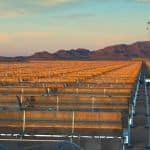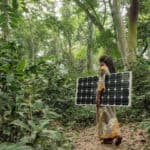Power Problem in a Changing Climate: The Renewable Energy Movement is Shortchanging Women and the Poor
Note: This post is one of NextBillion’s 12 most influential posts of 2018.
I had been standing in line for over an hour.
As I waited to pick up my name tag at the Global Climate Action Summit in San Francisco in September, nearing the last quarter of a long line, I noticed a white woman and a group of her peers crashing the line ahead. Others around me looked uncomfortable but said nothing. I gently nudged the woman who had jumped in front of us and asked, “Has the irony of cutting the line at a social justice event occurred to you?”
The woman turned and insisted, “This is not a social justice event.”
I was livid at this response. As a woman of Indian origin working in sub-Saharan Africa and living in present-day America, I did not understand how a person could view climate change as anything but a social justice issue. I am deeply aware of how inequity perpetuates both human and environmental degradation in our world. Were we not gathered in San Francisco to ensure that everyone, everywhere has what they need to prosper as the planet warms? Could she not see that “cutting the line” is what got us here in the first place?
The huge majority of people on the planet without clean, reliable energy have been waiting a century for the kinds of light, power and connectivity that the rest of us enjoy as the norm. The energy access line has been cut again and again for people of color, mostly in Africa and Asia, throughout our global history, with the privileged few gaining access and many others still waiting.
This means that, as many young girls become mothers and then grandmothers, they miss opportunities for a basic education; they labor in childbirth in unsafe, dark rooms; they walk hours every day to collect firewood, in spite of the risk of sexual assault and increasing rates of deforestation. Generations of women and their family members continue to inhale toxic clouds of indoor air pollution as they cook.
They are still waiting in line.
We have the solutions
Women are the most affected by climate change. And when we women organize against injustices in our world, we get things done. Malala Yousafzai, Ma Sisulu, Sarojini Naidu, Susan B. Anthony – the list of female changemakers, across generations and geographies, is endless. I often say that woman power is the largest untapped source of renewable energy in the world. This is why, since 2010, my organization Solar Sister has been fostering a grassroots clean energy revolution which places women at its very center. We are over 3,500 Solar Sister entrepreneurs – each with a face, a name, a family, a history – like Eucharia, whose solar lights are creating safer communities in rural Nigeria, and Raheli, who kickstarted a solar energy business with fellow Maasai women to bring clean power to nomadic communities in Tanzania.
As these women know, ever-improving technologies now allow for decentralized, renewable power systems to be adapted for rural, last-mile and underserved communities around the world. A host of determined social enterprises are focused on getting clean energy to as many people as possible, as quickly as possible. Distributors are walking, bicycling, motorbiking, riverboating and bussing to deliver renewable products and systems to places that may never see an electric grid.
Solar Sister and our fellow practitioners are doing this important work in communities that span the globe, from Frontier Markets in India, to Elle Solaire and SolarAid in Senegal, to members of the Women’s Earth and Climate Action Network across Latin America, sub-Saharan Africa and Asia. But so many remain without basic access. The work is just beginning, and it is sorely in need of investment. Yet investors are hesitant to support it. Why?
Three essential acts
I want to share three insights that call us to action, based on my journey in the last eight years with Solar Sister and this growing clean energy movement:
We need to stop shaming and excluding those working for the most vulnerable:
There is a disturbing trend in the energy access space, where we put purely profit-driven enterprises on a pedestal, while those (often nonprofits, community organizations and some social enterprises) who also bring a social justice lens are shamed and excluded. This manifests in the form of conferences, innovation competitions and investment speed dating rounds where primetime is reserved for commercial players focused solely on short-term financial returns. This exclusion, even if not malicious, leaves those of us seeking to reach less profitable communities feeling stigmatized, under-valued and under-supported. To succeed in reaching everyone with clean energy, we will need a mix of approaches. The market alone cannot, by definition, address the market failures that have kept women, girls, and remote and low-income communities at the fringes of an energized world.
Despite efforts to achieve Sustainable Development Goal 7’s objective of “affordable, reliable, sustainable and modern energy for all by 2030,” in reality the “for all” part is seriously lagging. Multiple reports, including the 2018 SDG 7 Energy Progress Report and Sustainable Energy for All’s latest Energizing Finance series, highlight the fact that vulnerable and low-income populations, where big profits are not guaranteed, are being left behind. The majority of investment in renewables also favors industry and non-residential providers, further excluding household needs.
So instead of excluding, let’s bring justice back to the table! Let’s be cognizant of the limits of the market. Let’s make real, meaningful investments to address systemic barriers to inclusion. Let’s support local capacity, awareness and delivery methods that are built to last, and built to reach the last mile.
We need more accountability on gender, race and local representation in our work:
The energy access sector is in dire need of prioritizing local women’s leadership and local representation in their work. The Energy Access Practitioner Network’s 2017 Survey highlights a growing number of women in key management positions, yet men continue to fill a disproportionate number of leadership and board roles. Then there is the question of race and local representation in these roles – a topic on which dialogue, data and transparency are scant. The energy access space is still dominated by a small number of largely white, often male, founder companies with Western expatriate leadership.
Not surprisingly, this power imbalance reflects the diversity gaps in the international development community. Solar Sister is also addressing such diversity gaps and asking hard questions. We are proud of our commitment to local women’s leadership. From country operations led by dynamic African women Olasimbo Sojinrin and Fatma Muzo, to the dozens of local women (and some men!) we employ across Tanzania and Nigeria, we are committed to hiring local. And yet Solar Sister recognizes that our board is majority American and white. We are exploring ways to grow a board that is more diverse and geographically representative of the communities in which we work. We know it will make us stronger. We are mapping a 2019 board recruitment plan with an intentional focus on diversity at senior leadership levels. We still have work to do.
Inclusion is an ongoing and urgent process for all of us working in energy access. Quantum Impact’s 2018 report on the “State of Diversity in Global Social Impact” begins to address meaningful inclusion and offers a starting point. The report’s evidence-based actions suggest ways to shift organizational culture rather than just conducting one-off trainings, and to incentivize action that creates representative leadership and decision-making. Let’s do the work.
We need a greater variety and volume of funding:
Reaching everyone with clean energy access calls for significant resources, risk and resolve. Relying solely on commercial markets will not automatically correct historic access gaps for marginalized communities. We also need public and philanthropic funding. Sustainable Energy for All’s Energizing Finance: Understanding the Landscape 2018 report flags the fact that finance to close the energy access gap by 2030 is dramatically off track, while finance for polluting and costly coal has been increasing.
Investments in renewable energy for those most in need are grossly inadequate and uneven. Acumen’s 2018 report Accelerating Energy Access: The Role of Patient Capital notes that while money raised by off-grid solar firms has seen an increase in absolute terms, two thirds of equity investments in the solar home system sector since 2012 have been focused on just four companies.
A lack of multi-year development funding combined with limited private sector investment in quick commercial wins comes at the cost of addressing the systemic issues highlighted above. And public investments in inclusive innovations and subsidies that focus on the needs of women and low-income communities are few and far between.
The line is being cut, yet again.
We are not waiting
Cutting in line at a global conference is a seemingly tiny injustice. Yet it speaks volumes about the biggest questions our planet is facing. We do have a choice. Will we be passive bystanders, or will we choose to speak up? It took more than one nudge from me, but the white woman who cut the line did step aside. And my speaking out encouraged other people to break their silence and act. It is not a perfect metaphor, but I hope, in retelling the story here, to provoke reflection on who has a right to clean energy and who is still waiting. We can choose to invest in a world powered by renewable energy. A path forward exists: In reality, the only thing we lack is the will to fund sustainable clean energy instead of dirty fuels. Working toward climate and energy justice means not letting the most vulnerable wait in line any longer.
As COP24, the world’s biggest climate change event unfolds in Poland, we need many, many more fast-moving lines, both literally and figuratively, for all of us – for you, reader, for me, and for women like Julieth Mollel, a Maasai elder, Solar Sister entrepreneur and role model for her teenage granddaughter Ritha, who is determined to become a scientist. The changing climate will impact each one of us in the coming years. Let’s choose to bring everyone to the table – our people and our planet deserve it.
Neha Misra is the Co-Founder and Chief Collaboration Officer of Solar Sister.
Illustration: a drawing of Solar Sister entrepreneur Julieth Mollel at her farm, by Fid Thompson.
- Categories
- Energy, Social Enterprise



